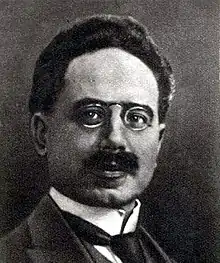Burgfriedenspolitik
Burgfriedenspolitik (German: [ˈbʊʁkfʁiːdn̩s.poliˌtiːk]), literally "castle peace politics" but more accurately a political policy of "party truce", is a German term used for the political truce the Social Democratic Party of Germany and the other political parties agreed to during World War I. The trade unions refrained from striking, the SPD voted for war credits in the Reichstag and the parties agreed not to criticize the government and its war. There were several reasons for the Burgfrieden: the Social Democrats believed it was their patriotic duty to support the government in war, they were afraid of government repression if they protested against the war, they feared living under an autocratic Russian Tsar more than the German constitutional monarchy and its Kaiser and they hoped to achieve political reforms after the war such as the abrogation of the inequitable three-class voting system by co-operating with the government.
The only member of parliament of any party to vote against war credits in the second session was Karl Liebknecht. In the third session on 20 March 1915, Otto Rühle joined him. Over the course of the war the number of SPD politicians opposed to the war steadily increased. Their resistance against the Burgfrieden politics led to the expulsion of Liebknecht, Rosa Luxemburg, Clara Zetkin and others from the SPD. These went on to found the Spartacist League, the Independent Social Democratic Party of Germany (USPD) and the Communist Party of Germany (KPD).
The only trade union to refuse the Burgfrieden was the Free Association of German Trade Unions (FVdG), which would later become the Free Workers' Union of Germany (FAUD).[1]
See also
- Spirit of 1914
- Union sacrée in France
References
- Thorpe 2000, p. 195.
Further reading
- Thorpe, Wayne (2000), "Keeping the Faith: The German Syndicalists in the First World War", Central European History, 33 (2): 195–216, doi:10.1163/156916100746301.
- Verhey, Jeffrey (2000), The Spirit of 1914: Militarism, Myth and Mobilization in Germany, New York: Cambridge University Press, ISBN 0-521-77137-4.
- Kruse, Wolfgang (1993), Krieg und nationale Integration: Eine Neuinterpretation des sozialdemokratischen Burgfriedensschlusses 1914/15 (in German), Essen: Klartext, ISBN 3-88474-087-3.
- Miller, Susanne (1974), Burgfrieden und Klassenkampf: Die deutsche Sozialdemokratie im Ersten Weltkrieg (in German), Düsseldorf: Droste.
